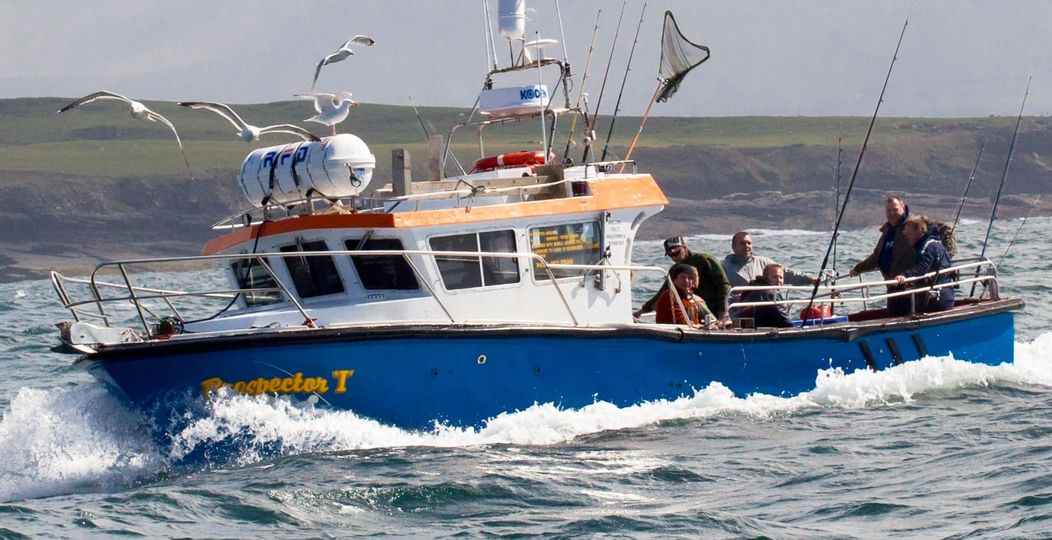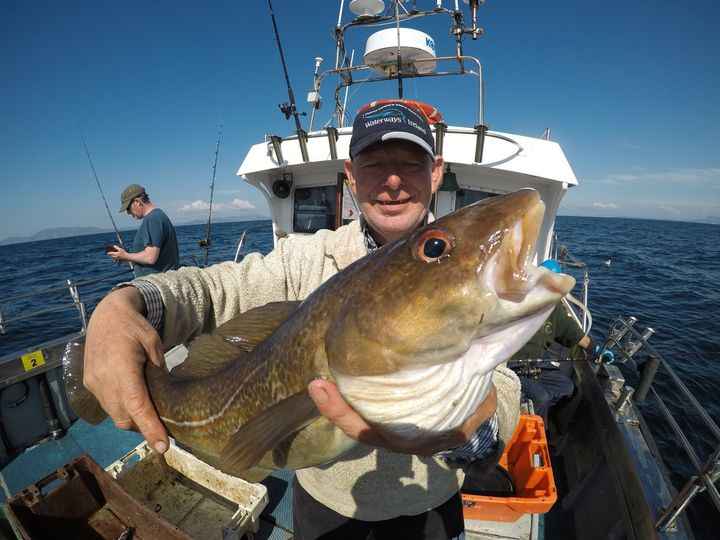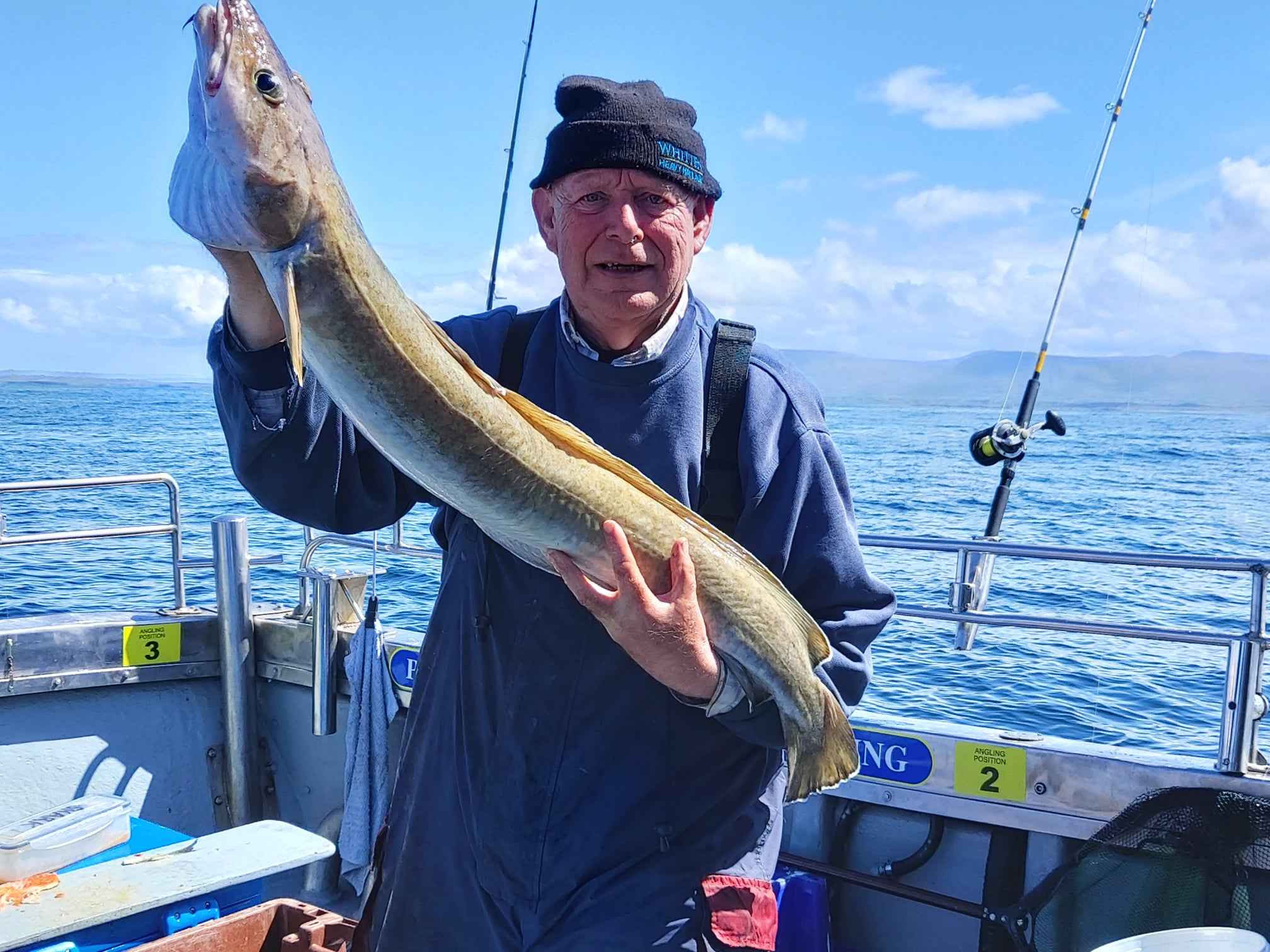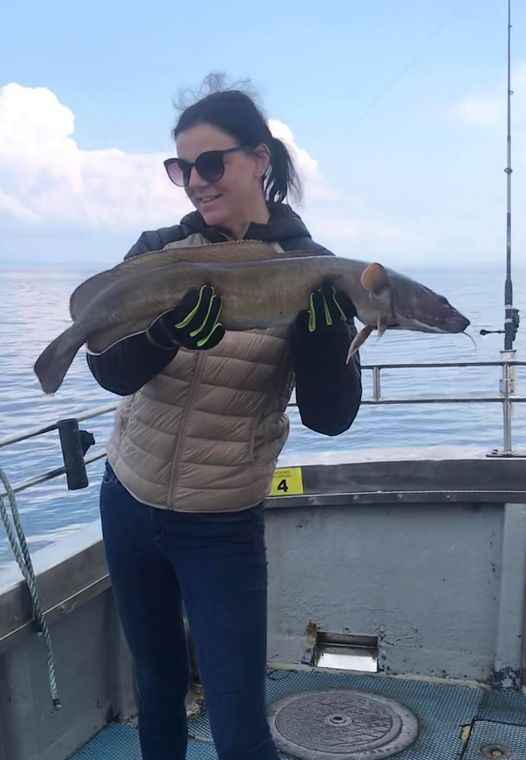Deep Sea Fishing, Prospector 1, Co. Sligo
🦈 Prospector 1 – Deep Sea Fishing Sligo – Ireland
Sea Fishing in Sligo, Reef & Wreck Fishing In Ireland
Peter Power is skipper of Prospector 1 in Co Sligo, Ireland and he has been a keen angler for over 30 years, ranging from sea angling experience on the East and West coasts of Ireland, together with Carribbean and Indian Ocean Big Game fishing experiences. In Addition, Peter has considerable fishing experience of river, lake and estuary fishing.
Fish tremble at the sound of his name.
Prospector 1 is a purpose built state of the art 33ft (9.9M) charter angling vessel. Skipper Peter Power, will bring you fishing in Donegal Bay from the idyllic harbour of Mullaghmore, County Sligo, Ireland (March through October). For all your sea angling in Mullaghmore & Sligo, get the charter boat from Peter Power.
If you are into sea fishing even off the shore or beach, why not try it from a boat? When you are out at sea there is so many more different types of fish you can catch and we know the best places to go. All you need to do is give us a call and we can take you out on our charter boat which is dedicated for fishing. We have the latest gadgets to find the fish or even a shark you want to catch on the day, you just need to tell us what you would like to try and catch and hopefully we can take you to the location of them types of fish for you. We can get Cod most days through the season as well as tope when we are out on our trips in the great Irish sea.
On a trip we can take you up to 48 mile into the sea which is more than enough to catch your dream fish on the day. If your not into fishing we can take you around different spots to see the wildlife on the shore lines, also you can watch the seals.
You can bring your own tackle or we can provide it for you on the day.
Bluefin Tuna Fishing Ireland
The island of Ireland has been recognized for many years as one of the world’s most important destinations for sea fishing. The 3000 km long coastline is one of the most varied and spectacular in the Northern Hemisphere with its hundreds of tranquil coves and backwaters, vibrant surf beaches and miles of awe-inspiring sea cliffs. The diverse nature of the coastline and the unique geographical location of Ireland, on the edge of the European continental shelf, where the coastal waters are heated by the North Atlantic stream (an offshoot of the Gulf Stream), means that the indigenous life in the sea is extremely rich and varied. The coastal waters of Ireland are rich in fish and visiting anglers can expect something in the region of 80 species to aspire to, so anything from a few grams of grams to a six-leaved shark of more than 400 kg can be expected!
Deep sea fishing Ireland
Irish deep sea fishing is associated with charter boats and is a very social form of fishing. Traditionally these vessels went to lows from centres that became famous and still excellent fishing such as Westport, Fenit and Kinsale. Nowadays charter boats can be hired from a larger number of centres and they fish for species such as blue sharks from the south and west coast, for large conger, ling and cod from sunken shipwrecks, and for top and flatfish over sandy soil. Charter boat fishing is lively and interesting even before a rule is cast; the skipper will assemble a group of fishermen who know each other at the start of the day or not, but who are well aware of the end, especially if they have had a big shark or ray. Packs can usually be rented, so everything the fisherman needs is a good set of waterproofs and a sense of adventure. The skippers have well-equipped fast vessels and modern navigation aids, but for most of them, coming from different generations of fishermen, their knowledge of the sea is as instinctive as breathing. A lot of local knowledge is passed on during the day and even more in the evening when the boat is tied up and the catch is divided and the scene shifts to a café on the water.
Deep sea fishing Sligo
The busy County Capital of Sligo is where the Garavogue River meets the sea at the head of Sligo Bay. The bay is bordered to the north by Roskeeragh Point and in the south by Aughris Head. The east coast is deeply cut by the estuaries of the rivers Drumcliff, Garavogue and Ballysadare, all of which explode into enormous sand plains at low tide. All three are rich sources of seafood and the Drumcliff’s mouth in Carney offers clams.
Sligo Bay on the Wild Atlantic Way has good varied sea fishing grounds from hard reefs to rocks and sandbanks for world-class inshore, offshore, light equipment and game deep sea fishing. Targeted game fishing on sea trout, big skate, tope, blue shark and giant greenfin tuna is available while the season and evening mackerel trips depart daily by appointment, other half day, full day and evening fishing trips are available to try and catch some of Sligo Bays many different species. Easily caught species include mackerel, pollack, coalfish, red, gray and tuber, ballan and cuckoo wrasse, dogfish, cod, pout, whiting, ling, all kinds of ray, dab, plaice, sole, skates, top and blue shark. To get the most out of the ground, and depending on what you want to catch, we can drift to a game with or without a drogue to slow us down to get the best out of the ground, or to anchor.
Wreck fishing in Ireland
Wreck fishing in deep waters can be very productive. There are many charted wrecks off the Irish coast, some lying deep in water of more than 50 fathoms. There are many more waiting to be discovered and the fisherman who is fishing for the first time in a boat can experience an unforgettable sport. It may take an hour to reach these markings, but time is worth it because of the size of the conger, ling, pollack and coalfish that are hunted out of them. Other species such as turbot and megrim can also be caught. Fishing enthusiasts specializing in this fishing use fishing rods in the 20 / 30lb class and reel lines of 30lbs test, and such gear can be hired from charter skippers.
The conditions must be good for a successful voyage, which usually means light winds and weak tides, especially if you are planning to anchor at anchor. Anchoring over a wreck is an art in itself and success depends heavily on the skill of the skipper. Drifting is normally the best approach if the target is pollack, coalfish or cod. It often works well for ling, but if fishing goes slowly or if a wreck is heavily fished, anchoring can yield better results. If conger is the target, anchoring is more or less essential.
The traditional natural and artificial bait works well for demolition, although it may be worthwhile to scale them up a bit. However, tackling losses can be high, so costs are a consideration. The use of braiding is strongly recommended, especially in deep water where troubleshooting can be a problem. The overload depends on the expected size of the fish, but the need to remove them from the wreck requires a larger than normal safety margin. Traces generally also require an upgrade, especially when using more than one hook. Two 30-pound fish pulling in the opposite direction can withstand more than most normal platforms.
With many other good fishing opportunities, wreck fishing is only part of the Sligo deep sea fishing mix, but it is certainly one of the most exciting. Deep water, big fish and twisted metal offer exceptional challenges and exceptional rewards.
Big Game Species Include:
Giant Bluefin Tuna From Mid August early November.
Broad Bill Sword Fish also swim with the giant Bluefinn Tuna.




